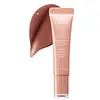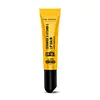What's inside
What's inside
 Key Ingredients
Key Ingredients

 Benefits
Benefits

 Concerns
Concerns

 Ingredients Side-by-side
Ingredients Side-by-side

Diisostearyl Malate
EmollientBis-Behenyl/Isostearyl/Phytosteryl Dimer Dilinoleyl Dimer Dilinoleate
EmollientBis-Diglyceryl Polyacyladipate-2
EmollientHydrogenated Polyisobutene
EmollientOctyldodecanol
EmollientMicrocrystalline Wax
Emulsion StabilisingSynthetic Wax
AbrasiveParfum
MaskingPolyglyceryl-2 Triisostearate
EmulsifyingPunica Granatum Seed Oil
EmollientCI 77891
Cosmetic ColorantSilica Dimethyl Silylate
EmollientCI 77491
Cosmetic ColorantCI 19140
Cosmetic ColorantCI 77499
Cosmetic ColorantWater
Skin ConditioningTocopherol
AntioxidantSqualane
EmollientCI 15850
Cosmetic ColorantCeramide NP
Skin ConditioningGlycine Max Polypeptide
Skin Conditioning1,2-Hexanediol
Skin ConditioningPropylene Glycol
HumectantButylene Glycol
HumectantPolyglutamic Acid
Skin ConditioningSodium Hyaluronate
HumectantEthylhexylglycerin
Skin ConditioningDiisostearyl Malate, Bis-Behenyl/Isostearyl/Phytosteryl Dimer Dilinoleyl Dimer Dilinoleate, Bis-Diglyceryl Polyacyladipate-2, Hydrogenated Polyisobutene, Octyldodecanol, Microcrystalline Wax, Synthetic Wax, Parfum, Polyglyceryl-2 Triisostearate, Punica Granatum Seed Oil, CI 77891, Silica Dimethyl Silylate, CI 77491, CI 19140, CI 77499, Water, Tocopherol, Squalane, CI 15850, Ceramide NP, Glycine Max Polypeptide, 1,2-Hexanediol, Propylene Glycol, Butylene Glycol, Polyglutamic Acid, Sodium Hyaluronate, Ethylhexylglycerin
Hydrogenated Polyisobutene
EmollientDiisostearyl Malate
EmollientPetrolatum
EmollientMicrocrystalline Wax
Emulsion StabilisingEthylhexyl Salicylate
UV AbsorberEthylhexyl Triazone
UV AbsorberDiethylhexyl Butamido Triazone
UV AbsorberZinc Oxide
Cosmetic ColorantC12-15 Alkyl Benzoate
AntimicrobialIsostearic Acid
CleansingPolyhydroxystearic Acid
EmulsifyingButyrospermum Parkii Butter
Skin ConditioningButter
Skin ConditioningAstrocaryum Murumuru Seed Butter
EmollientOlea Europaea Fruit Oil
MaskingCaprylic/Capric Triglyceride
MaskingBis-Behenyl/Isostearyl/Phytosteryl Dimer Dilinoleyl Dimer Dilinoleate
EmollientSimmondsia Chinensis Seed Oil
EmollientArgania Spinosa Kernel Oil
EmollientSorbitan Olivate
EmulsifyingRicinus Communis Seed Oil
MaskingEthylene/Propylene/Styrene Copolymer
Euphorbia Cerifera Wax
Beeswax
Emulsion StabilisingSqualane
EmollientPunica Granatum Seed Oil
EmollientGlycerin
HumectantButylene Glycol
HumectantAscorbyl Palmitate
AntioxidantCeramide AP
Skin ConditioningLauryl Laurate
Skin ConditioningSilica Dimethyl Silylate
EmollientTocopheryl Acetate
AntioxidantOlea Europaea Fruit Extract
BleachingOlea Europaea Leaf Extract
PerfumingOligopeptide-1
Skin ConditioningButylene/Ethylene/Styrene Copolymer
Caprylyl Methicone
Skin ConditioningHyaluronic Acid
HumectantHydrogenated Polyisobutene, Diisostearyl Malate, Petrolatum, Microcrystalline Wax, Ethylhexyl Salicylate, Ethylhexyl Triazone, Diethylhexyl Butamido Triazone, Zinc Oxide, C12-15 Alkyl Benzoate, Isostearic Acid, Polyhydroxystearic Acid, Butyrospermum Parkii Butter, Butter, Astrocaryum Murumuru Seed Butter, Olea Europaea Fruit Oil, Caprylic/Capric Triglyceride, Bis-Behenyl/Isostearyl/Phytosteryl Dimer Dilinoleyl Dimer Dilinoleate, Simmondsia Chinensis Seed Oil, Argania Spinosa Kernel Oil, Sorbitan Olivate, Ricinus Communis Seed Oil, Ethylene/Propylene/Styrene Copolymer, Euphorbia Cerifera Wax, Beeswax, Squalane, Punica Granatum Seed Oil, Glycerin, Butylene Glycol, Ascorbyl Palmitate, Ceramide AP, Lauryl Laurate, Silica Dimethyl Silylate, Tocopheryl Acetate, Olea Europaea Fruit Extract, Olea Europaea Leaf Extract, Oligopeptide-1, Butylene/Ethylene/Styrene Copolymer, Caprylyl Methicone, Hyaluronic Acid
 Reviews
Reviews

Ingredients Explained
These ingredients are found in both products.
Ingredients higher up in an ingredient list are typically present in a larger amount.
We don't have a description for Bis-Behenyl/Isostearyl/Phytosteryl Dimer Dilinoleyl Dimer Dilinoleate yet.
Butylene Glycol (or BG) is used within cosmetic products for a few different reasons:
Overall, Butylene Glycol is a safe and well-rounded ingredient that works well with other ingredients.
Though this ingredient works well with most skin types, some people with sensitive skin may experience a reaction such as allergic rashes, closed comedones, or itchiness.
Learn more about Butylene GlycolDiisostearyl Malate is an emollient and most often used in lip products. It comes from isostearyl alcohol, a fatty acid, and malic acid, an AHA.
As an emollient, Diisostearyl Malate helps create a thin film on your skin to trap moisture in. This helps keep your skin soft and smooth.
Hydrogenated Polyisobutene is a synthetic polymer. Polymers are compounds with high molecular weight. Hydrogenated Polyisobutene is an emollient and texture enhancer.
In one study, Hydrogenated Polyisobutene showed better skin hydration levels than Caprylic/Capric Triglyceride. As an emollient, it helps keep your skin soft and hydrated by trapping moisture in.
Hydrogenated Polyisobutene is often used as a mineral oil replacement.
Learn more about Hydrogenated PolyisobuteneMicrocrystalline Wax is created by de-oiling petroleum. It is highly refined and purified before being added to cosmetics.
Microcrystalline Wax is used to enhance the texture and create even consistency. It helps stabilize a product by preventing ingredients from separating.
Punica Granatum Seed Oil is created from the seeds of the pomegranate. Pomegranate seed oil helps hydrate the skin, is anti-inflammatory, and contains antioxidants.
Pomegranates are rich in fatty acids, including an unsaturated fatty acid by the name of Punicic acid. Other components of pomegranates include Vitamin E, Vitamin C, and bioactive lipids such as phytosterols, phospholipids, and triterpenes. Punicic acid helps soothe inflammation.
As an emollient, pomegranate oil creates a thin film on the skin. This film helps prevent moisture loss, keeping your skin hydrated.
Learn more about Punica Granatum Seed OilThis silica is mainly used to thicken oils and suspend particles in oils. It is not water soluble.
According to the manufacturer, it:
The manufacturer also claims this ingredient to be useful in makeup.
In lipstick formulations, this ingredient improves color payoff, reduces pigment settling, and reduces oil bleeding. This ingredient also improves the grip of powder products such as dry shampoos.
Learn more about Silica Dimethyl SilylateSqualane is an emollient that helps the skin hold onto moisture. It's an oily liquid that occurs naturally in certain types of fish and plant oils.
Because squalane boosts hydration in the skin, it also comes with plenty of benefits: it is an antioxidant and can help fight free radicals and skin damage. Squalane is also found to have a detoxifying effect when applied.
Squalane comes from squalene, which occurs naturally within the sebum of our skin. It is one of the oils our skin produces to keep itself hydrated. Squalane is the hydrogenated version of squalene and has a longer shelf life.
Research shows that squalane is non-irritating (even at 100% concentration).
In general, it's a fantastic ingredient. It does a great job at hydrating the skin, and it's suitable for those with sensitive skin.
The source of squalane may impact malassezia / fungal acne. This is because olive oil derived squalane can contain impurities such as fatty acids and plant waxes. Sugarcane derived squalane is recommended for anyone with malassezia concerns.
Is squalane vegan?
This depends on the source. Squalane can be derived from both plants and animals. Most squalane used in skincare comes from plants.
Please note: the source of squalane is only known if disclosed by the brand. We recommend reaching out to the brand if you have any questions about their squalane.
Read more about squalene with an "e".
Is squalane an oil?
Squalane is often called an oil, but it’s technically not; it’s a hydrocarbon, meaning it’s only made of carbon and hydrogen, unlike true oils which are triglycerides made of fatty acids and glycerol.
The term “oil-free” isn’t regulated, so companies can define it however they want. Some exclude all oils, while others just avoid mineral oil or comedogenic oils.
While some people avoid oils thinking they cause breakouts, the right kind of oil (or oil-like ingredient like squalane) can actually help balance and hydrate your skin. It’s worth testing out simple oils or squalane to see what works best for your skin.
Learn more about Squalane